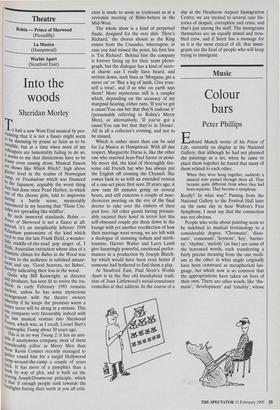Theatre
Robin — Prince of Sherwood (Piccadilly)
La Musica
(Hampstead) Worlds Apart (Stratford East)
Into the woods
Sheridan Morley
T. o hail a new West End musical by pro- claiming that it is not a fiasco might seem to be damning by praise so faint as to be visible but at a time when most of my Colleagues are lamentably failing to do so, irti seems to me that distinctions have to be 'tom even among dross. Musical fiascos are shows like Which Witch?, high above glacier level in the realms of Norwegian callM, or Troubadour which was financed ItlY the Japanese, arguably the worst thing they done since Pearl Harbor, in which dung of the chorus girls, told to improvise urlag a battle scene, memorably announced in my hearing that 'These Cm- des are spreading like wildfire'. „ B. Y such immortal standards, Robin — 7Ince of Sherwood is not a fiasco at all: 1,lstead, it's an inexplicably leftover 1959 Palladium pantomime of the kind which used to star the late Frank Ifield, a wonder- th._."1!lY middle-of-the-road pop singer of, I dramatic Australian extraction whose idea of a i'camatic climax for Babes in the Wood was „? torn to the audience in subdued amaze- ment and say, 'Good heavens, no Babes', thereby indicating their loss in the wood. Quite why Bill Kenwright, as director !,11.11 producer, has seen fit to revive the tra- onion in early February 1993 remains unclear unless he has some mysterious „arrangement with the theatre owners better if he keeps the premises warm a tter score will be along in a minute. This t-ne compares very favourably indeed with e last musical venture into Sherwood Forest, which was, as I recall, Lionel Bart's catastrophic Twang about 30 years ago. . This is in no way Twang 2: it has an ami- able if anonymous company, most of them considerably jollier as Merry Men than 'nose Kevin Costner recently managed to gather round him for a turgid Hollywood 1,11aP-around-the-camp a couple of years nek. It has more of a pamphlet than a touring by way of plot, and is built on the ! Joseph/Dreamcoat principle, which Is that if enough people rush towards the footlights baring their teeth at you all criti- cism is made to seem as irrelevant as at a revivalist meeting of Bible-belters in the Mid-West. The whole show is a kind of perpetual finale, designed for the very dim: 'Here's Richard,' the chorus shouts as the King enters from the Crusades, whereupon, in case you had missed the point, his first line is `I'm Richard'. Behind him the company is forever lining up for their team photo- graph, but the dialogue has a kind of surre- al charm: can I really have heard, and written down, such lines as `Morgana, get a move on' or 'Buy a leg of lamb, Give your- self a treat', and if so who on earth says them? More mysterious still is a couplet which, depending on the accuracy of my marginal hearing, either runs, 'If you've got a cause/You can bet that they'll endorse it' (presumably referring to Robin's Merry Men), or alternatively, 'If you've got a cause/You can bet that they're in Dorset'. All in all a collector's evening, and not to be missed. Which is rather more than can be said for La Musica at Hampstead. With all due respect, Marguerite Duras is, like the other one who married Jean-Paul Sartre or possi- bly never did, the kind of thoroughly tire- some old French bat who has always put the English off crossing the Channel. She comes back to us with an extended version of a one-act piece first seen 20 years ago; it now runs 80 minutes going on several hours, and still concerns a couple of near- divorcees meeting on the eve of the final decree to rake over the embers of their past love. All other guests having presum- ably vacated their hotel in terror lest this self-obsessed couple pin them down in the lounge with yet another recollection of how their marriage went wrong, we are left with a duologue of stunning tedium and mirth- lessness. Harriet Walter and Larry Lamb give hauntingly powerful, emotional perfor- mances in a production by Joseph Blatch- ley which would have been even better if someone had bothered to find them a play. At Stratford East, Paul Sirett's Worlds Apart is in the fine old knockabout tradi- tion of Joan Littlewood's social-conscience comedies at that address. In the course of a day at the Heathrow Airport Immigration Centre, we are treated to several case his- tories of despair, corruption and crisis, and a that's just among the staff. The immigrants themselves are an equally mixed and trou- bled crew, and if Sirett has a message for us it is the most cynical of all: that immi- grants are the kind of people who will keep trying to immigrate.


















































 Previous page
Previous page